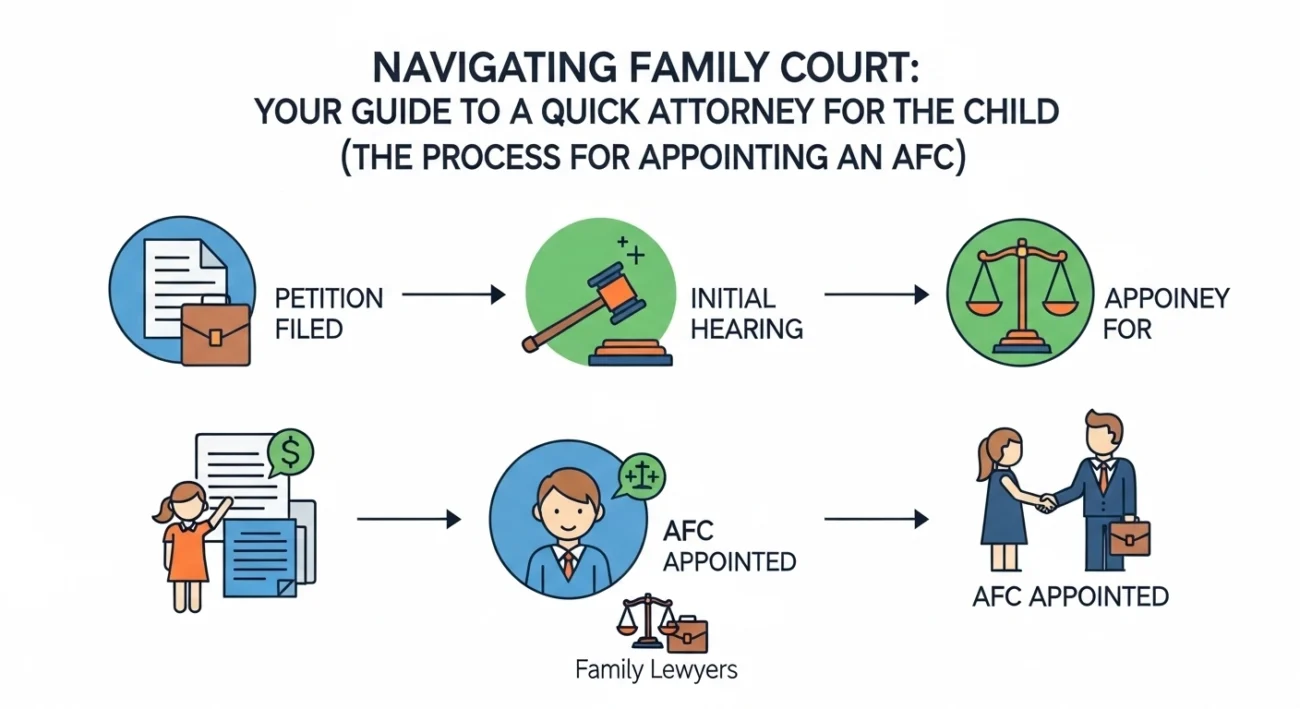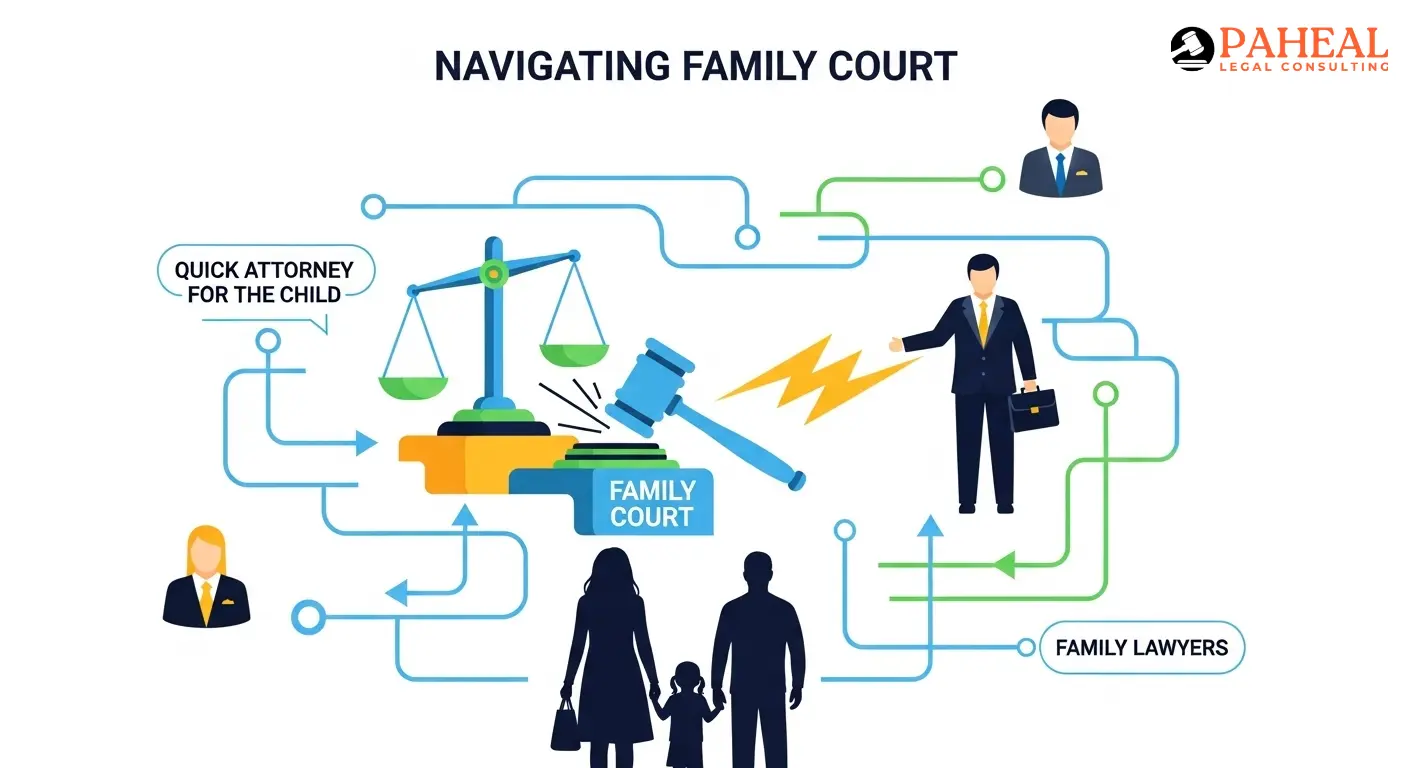Child Custody in Family Law In all contested child custody cases parents can get a contentious experience with the court system. When there is significant discord, or questions of a child’s safety, the Court may assign a laywer to represent the best interest of the child called an Attorney for the Child (AFC). This post outlines what the AFC does, how it is appointed, and what you can do to be ready for a swift process.
What an Attorney for the Child Does
An Attorney for the Child is not your lawyer; they are appointed to represent your child’s perspective independently of both parents.
- Investigating the situation: An AFC will interview the child, both parents, and other relevant individuals like teachers or counselors. They will also review important documents such as medical or school records.
- Advocating for the child’s interests: For older, more mature children, the AFC will represent their expressed wishes to the court. For younger children, or if a child’s stated preference seems contrary to their best interest, the AFC will present their professional assessment of what is best for the child.
- Ensuring the child’s voice is heard: The AFC provides a neutral perspective to the judge, helping to focus the proceedings on the child’s welfare and needs.
- Keeping the process moving: An AFC can help facilitate a resolution by providing the court with an unbiased view, which can sometimes lead to a quicker settlement outside of a full trial.
It is crucial to remember that your communications with the AFC are not confidential and can be shared with the court.
The Process for Appointing an AFC

The appointment of an AFC follows a specific procedure within the family court system.
1. The Request: A family court judge can, on their own initiative, decide that appointing an AFC is necessary. Alternatively, one or both parents can file a formal motion asking the court to appoint an AFC. This is common in high-conflict cases or when there are concerns about abuse, neglect, or substance abuse.
2. Court Assessment: If a motion is filed, the court will hold a hearing to consider the request. The judge will evaluate the case’s complexity, the level of conflict, and the potential impact on the child to determine if an AFC is warranted.
3. Appointment: If the court approves the request, a qualified attorney from a court approved panel is appointed. These lawyers have specialized training in child development and representing minors.
4. The Investigation: After their appointment, the AFC begins their investigation. They will meet with the child in a comfortable setting, interview parents and others involved, and gather necessary records.
5. Court Presentation: The AFC will present their findings to the court, advocating for the child’s position. The AFC’s input is a significant factor in the judge’s final custody determination.
How to Expedite the Process
While the court controls the timeline, you can take steps to ensure the process proceeds as smoothly and quickly as possible.
- File your motion promptly: If you are requesting an AFC, complete and file the necessary motion with the court as soon as possible.
- Cooperate fully with the AFC: Be responsive to all requests for information and interviews. Make your child available to meet with the attorney and be ready to sign release forms for records.
- Gather documents in advance: Compile all relevant medical and school records. Having these ready will save time once the AFC is appointed.
- Maintain an even keel: Family court is emotional, but staying calm and focused on your child’s well-being is vital. Avoid using the AFC as a tool to badmouth the other parent, as this can backfire.
Cost of an AFC
The court decides who pays for the AFC. The cost is typically split between the parents based on their financial ability. The court uses financial affidavits to make this determination. In cases where parents cannot afford the cost, the court may order the state to cover the legal fees.
Conclusion
The appointment of an Attorney for the Child is a serious step that prioritizes the child’s needs during a challenging legal process. By understanding the AFC’s role, cooperating fully, and preparing all necessary information, you can help ensure the process is as efficient as possible, ultimately serving the best interests of your child.
Reference:
- Legal Services Corporation (LSC): A U.S. government-funded, independent, non-profit organization that provides financial support for civil legal aid programs nationwide. You can find more information about their mission and impact.
- American Bar Association (ABA) Center on Children and the Law: Offers resources and best practices for legal professionals representing children and families.
- National Association of Counsel for Children (NACC): A non-profit professional membership and legal advocacy organization that provides training for attorneys representing children in court.
- LawHelp.org: Provides a directory of legal aid and pro bono legal services for low-income individuals.
- Family Justice Initiative: An organization that brings together professionals to advocate for high-quality legal representation for families in child welfare courts.

